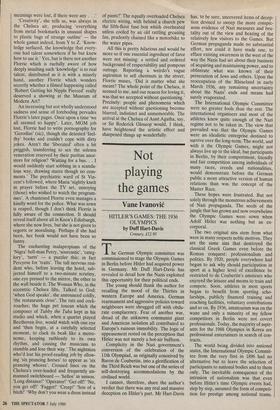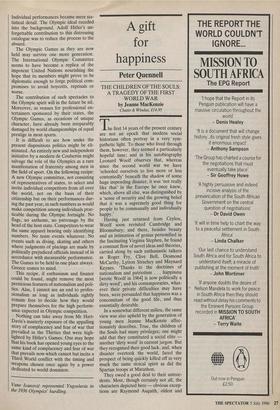Not playing the games
Vane Ivanovi6
HITLER'S GAMES: THE 1936 OLYMPICS
by Duff Hart-Davis
Century, f12.95
The German Olympic committee was commissioned to stage the Olympic Games in Berlin before Hitler had acquired power in Germany. Mr Duff Hart-Davis has revealed in detail how the Nazis exploited this opportunity for their political ends.
The young should thank the author for recalling the mood of the Thirties in western Europe and America. German rearmament and aggressive policies toward neighbours were shrugged off with obdu- rate complacency. Fear of another war, dread of the unknown communist giant and American isolation all contributed to Europe's ruinous immobility. The logic of appeasement rested on the perception that Hitler was not merely a hot-air buffoon.
Complicity in the Nazi government's conversion of the celebration of the 11th Olympiad, as originally conceived by Baron de Coubertin, into a glorification of the Third Reich was but one of the series of self-destroying accommodations by the civilised world.
I cannot, therefore, share the author's verdict that there was any real and massive deception on Hitler's part. Mr Hart-Davis has, to be sure, uncovered items of decep- tion devised to sweep the more conspic- uous evidence of Nazi measures and bru- tality out of the view and hearing of the relatively few visitors to the Games. But German propaganda made no substantial effort, nor could it have made one, to efface existing awareness in the west of the way the Nazis had set about their business of acquiring and maintaining power, and to obliterate what was known of their persecution of Jews and others. Upon the reoccupation of the Rhineland in early March 1936, any remaining uncertainty about the Nazis' ends and means had surely evaporated.
The International Olympic Committee were no greater fools than the rest. The international organisers and most of the athletes knew quite enough of the Nazi regime not to be taken in. The view that prevailed was that the Olympic Games were an. idealistic enterprise destined to survive over the long-term. The world, and with it the Olympic Games, might not always live up to the ideal, but participants in Berlin, by their comportment, friendly and fair competition among individuals of many races, creeds and nationalities, would demonstrate before the German public a more attractive version of human relations than was the concept of the Master Race.
These hopes were frustrated. But not solely through the monstrous achievements of Nazi propaganda. The seeds of the jungle that has grown and now overwhelms the Olympic Games were sown when Adolf Hitler was nothing but an ex- corporal.
The two original sins stem from what were in many respects noble motives. They are the same sins that destroyed the classical Greek Games even before the Roman conquest: professionalism and politics. By 1920, people everywhere had begun to ask why should participation in sport at a higher level of excellence be restricted to de Coubertin's amateurs who enjoyed the leisure and means to train and compete. Soon, athletes in most sports began to benefit from sporting scho- larships, publicly financed training and coaching facilities, voluntary contributions and so on. By 1936, amateurism was on the wane and only a minority of my fellow competitors in Berlin were not covert professionals. Today, the majority of aspir- ants for the 1988 Olympics in Korea are professional entertainers in search of con- tracts.
The world being divided into national states, the International Olympic Commit- tee from the very first in 1896 had no alternative but to leave the selection of participants to national bodies and to them only. The inevitable consequence of the intrusion of nationalism was that even before Hitler's time Olympic events had, step by step, assumed the form of competi- tion for prestige among national teams. Individual performances became mere sta- tistical detail. The Olympic ideal receded into the background. Adolf Hitler's un- forgettable contribution to this distressing catalogue was to reduce the process to the absurd.
The Olympic Games as they are now held may survive one more generation. The International Olympic Committee seems to have become a replica of the impotent United Nations nourishing the hope that its members might prove to be diplomatic enough to forge political com- promises to avoid boycotts, reprisals or worse.
The contribution of such spectacles to the Olympic spirit will in the future be nil. Moreover, as venues for professional en- tertainers sponsored by their states, the Olympic Games, as occasions of unique character, have already been irreparably damaged by world championships of equal prestige in most sports.
It is difficult to see how under the present dispositions politics might be eli- minated. An entirely new and independent initiative by a modern de Coubertin might salvage the role of the Olympics as a rare manifestation of fraternity among men in the field of sport. On the following recipe: A new Olympic committee, not consisting of representatives of states, to select and invite individual competitors from all over the world, not on the basis of their citizenship but on their performances dur- ing the past year, in such numbers as would make competition among individuals prac- ticable during the Olympic fortnight. No flags, no anthems, no patronage by the head of the host state. Competitors to wear the same apparel bearing only identifying numbers. No team events whatever. No events such as diving, skating and others where judgments of placings are made by politically prejudiced officials instead of in accordance with measurable performance. The Games to be held in one place always. Greece comes to mind.
This recipe, if enthusiasm and finance could be found, might remove the most pernicious features of nationalism and poli- tics. Alas, I cannot see an end to profes- sionalism as. long as individuals rightly remain free to decide how they would prepare themselves for the high perform- ance expected in Olympic competition.
Nothing can take away from Mr Hart- Davis's masterly exposure of the appalling story of complacency and fear of war that prevailed in the Thirties that were high- lighted by Hitler's Games. One may hope that his book has opened young eyes to the same kind of complacency and fear of war that prevails now which cannot but incite a Third World conflict with the timing and weapons chosen once again by a power dedicated to world dominion.
Vane Ivanovie represented Yugoslavia in the 1936 Olympics' hurdling.



















































 Previous page
Previous page